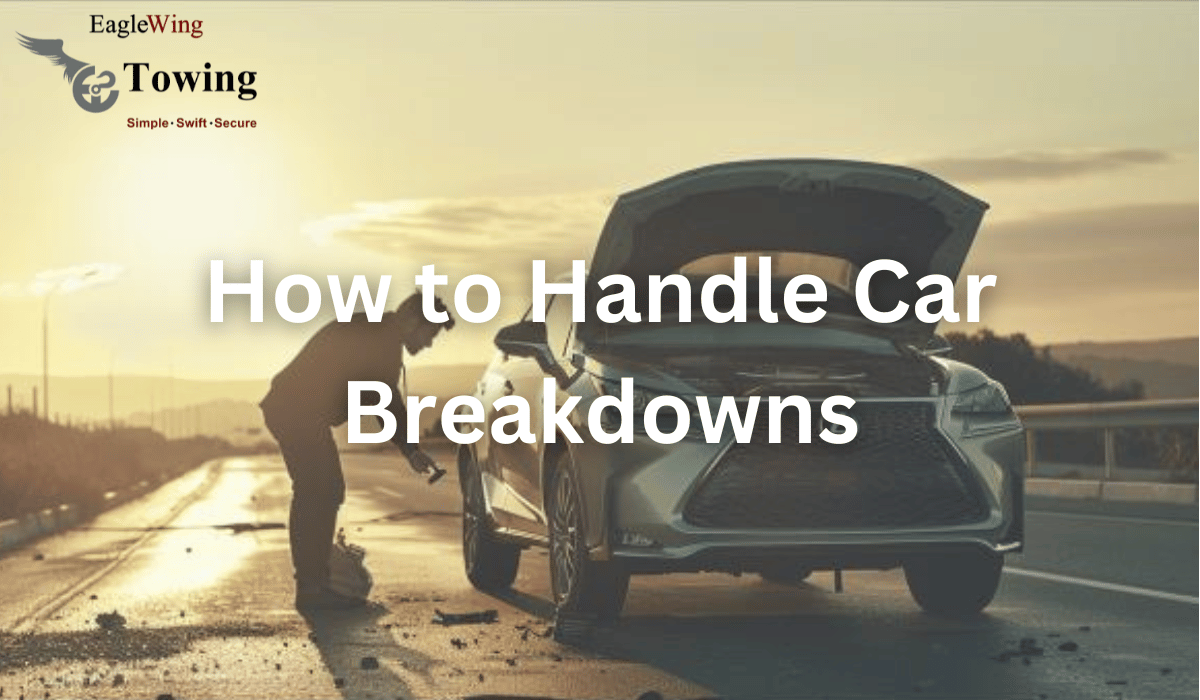What To Do In Case Your Car Breaks Down
Car breakdowns can be stressful and inconvenient, but being prepared and knowing how to handle them can make all the difference. Understanding the common causes of vehicle breakdowns, knowing what to do when your car breaks down, and taking preventive measures can help you deal with breakdowns with confidence. We’ve put together this blog post to help with what to do in case of a car breakdown.
Why Did My Car Break Down?
Common causes of car breakdowns include dead batteries, flat tires, engine overheating, and transmission problems.
Some of the most common reasons why cars break down:
Dead Battery
A dead battery is one of the leading causes of car breakdowns. Whether it’s drained accidentally by leaving lights on or corroded over time, a faulty battery can leave you stranded when you least expect it.
Fuel Leak
A fuel leak can pose a serious safety hazard and lead to a breakdown if not addressed promptly. Leaking fuel can result from damaged fuel lines or faulty seals, so it’s essential to address any signs of a fuel leak immediately.
Transmission Problems
Issues with the transmission, such as low fluid levels or complete breakdowns, can render a vehicle immobile. Regular transmission maintenance and fluid checks can help prevent transmission-related breakdowns.
Tire Problems
Flat tires or blowouts are common causes of breakdowns, especially on long road trips. Keeping your tires properly inflated and checking for signs of wear and tear can help prevent tire-related breakdowns.
Overheated Engine
An overheated engine can result from oil or coolant leaks, low fluid levels, or other cooling system issues. Regularly checking fluid levels and addressing any leaks can help prevent engine overheating and breakdowns.
Remember to schedule regular maintenance checks and address any issues promptly to keep your car running smoothly.
How to Handle a Car Breakdown
In the unfortunate event of a car breakdown, knowing how to safely handle your situation calmly and effectively can make all the difference.
Follow these steps to ensure your safety and get back on the road as soon as possible:
1. Find a Safe Location
If you experience a breakdown, try to pull over to a safe location away from the flow of traffic. Look for the nearest exit or a roadside shoulder where you can safely park your car.
2. Use Hazard Lights
Once you’ve found a safe spot, turn on your hazard warning lights to alert other drivers of your presence, especially if you’re on a busy highway or in low visibility conditions.
3. Assess the Situation
Take a moment to assess the situation and determine if it’s something you can safely address yourself. Listen for any unusual noises or smells coming from your vehicle that may indicate the cause of the breakdown.
4. Contact Roadside Assistance
If you have a roadside assistance plan, use it to contact a towing service provider who can help you with towing, repairs, or emergency roadside assistance. If you don’t have a plan, consider calling emergency services for assistance.
5. Set Up Reflective Triangles
If you’re stopped on a busy highway or in an area with limited visibility, use reflective triangles or other warning devices to alert approaching drivers to your presence and help prevent accidents.
6. Stay Safe
While you wait for assistance to arrive, stay inside your vehicle if possible and keep your seatbelt fastened. If you need to exit the vehicle, wear a reflective vest and stay alert to traffic.
7. Take Deep Breaths
Dealing with a car breakdown can be stressful, but try to stay calm and take deep breaths to help manage any anxiety or frustration.
8. Have an Emergency Kit
It’s always a good idea to have a basic car emergency kit on hand, including essentials like water, snacks, a flashlight, and basic tools. Having these items can make waiting for assistance more comfortable and safer.
Remember to stay calm, assess the situation, and prioritize your well-being until help arrives.
Preventing Car Breakdowns
Preventative measures are key to avoiding car breakdowns. Regular vehicle maintenance and addressing warning signs promptly can help keep your car running smoothly. Here’s how to prevent breakdowns:
1. Regular Car Service and Checks
Follow the manufacturer’s service schedule and conduct periodic maintenance checks. This helps identify potential issues early on, reducing the risk of breakdowns.
2. Keep Your Car Hydrated
Ensure essential fluids like engine oil, brake fluid, and coolant are at adequate levels. Topping up these fluids regularly prevents overheating and friction, ensuring smooth operation.
3. Avoid Overloading
Overloading your vehicle strains its suspension, tires, and chassis, leading to instability and potential breakdowns. Plan your loads carefully to avoid unnecessary weight.
4. Drive with Caution
Good driving habits are crucial in preventing breakdowns. Avoid sudden braking, excessive speeding, and aggressive driving practices that accelerate wear and tear on your car’s components.
5. Act on Warning Signs
Pay attention to warning lights or unusual sounds from your vehicle. Ignoring these signs can lead to more significant issues and potential breakdowns. Address warning signals promptly to prevent breakdowns.
Does Car Insurance Cover Towing for Breakdowns?
Car insurance usually doesn’t cover towing for breakdowns unrelated to accidents. But, Mechanical Breakdown Insurance (MBI) is an option for major mechanical failures not caused by accidents or wear and tear. MBI is an add-on to car insurance covering significant issues like engine failures or air conditioner hose punctures.
It’s important to note that MBI excludes minor repairs and has deductibles ranging from $200 to $400. Companies like Geico, Progressive, and Mercury Insurance offer MBI coverage for newer vehicles under specific terms. Before choosing MBI, understand its coverage, including major components like transmission, engine, and steering, but excluding routine maintenance like oil changes or tire replacements.
Empower yourself to prevent car breakdowns
By following these simple yet effective tips, you can empower yourself to handle breakdowns with confidence and ease. Whether it’s staying vigilant with regular auto maintenance or knowing when to call for roadside assistance, every step you take towards prevention is a step towards safer travels.
So, keep your emergency kit stocked, your senses sharp, and your calm demeanor intact. With the right mindset and preparation, you’ll be ready to tackle any road ahead.
If you ever find yourself in a roadside emergency in Colorado, don’t hesitate to contact Eagle Wing Towing for prompt and reliable assistance. Our team is available 24/7 to provide towing services, roadside assistance, and other services to help you get back on track. Drive with confidence knowing that Eagle Wing Towing has got your back on the road. Drive safe, stay prepared, and may your journeys be smooth and trouble-free.


